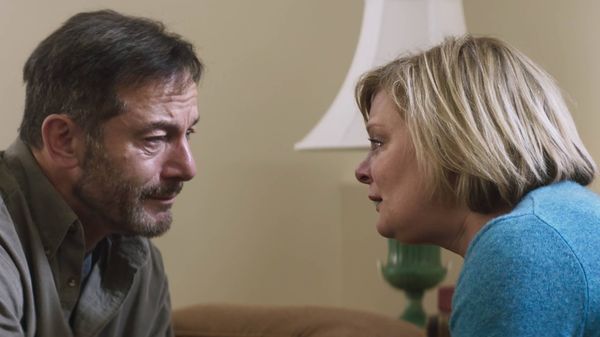Eye For Film >> Movies >> Mass (2021) Film Review
Mass
Reviewed by: Jeremy Mathews

The word “tense” gets thrown around a lot in film criticism. We all love to talk about taut excitement of thrillers, action extravaganzas and horror movies. But few works match the sheer amount of impending dread as Fran Kranz’s Mass, 75 percent of which takes place in a single small room with the same four characters. The film is about a topic so horrifying that a good amount of time lapses before anyone actually says what happened aloud.
The situation is a dramatic powder keg: A reconciliation meeting between the parents of a victim of a school shooting and the parents of the shooter. Everyone involved knows it will not be an easy conversation, but, with the facilitation of a support organisation which arranges the meeting, they pursue it anyway. Maybe they hope it will help them heal, maybe they hope it will provide answers or decrease their guilt.

The meeting takes place at an Episcopal church that lends the use of its back room. An effective prologue sets the stage as the church’s coordinator (Breeda Wool) nervously prepares the room for the event, and the organisation’s coordinator (Michelle N Carter) studiously double-checks the setting to assure that there won’t be more painful triggers than necessary. Going into these scenes with no context, they establish the gravity of the situation so well that the mere knowledge of what happened feels like a burden.
Martha Plimpton and Jason Isaacs play the parents of one of 10 victims of a school shooting, and Ann Dowd and Reed Birney play the parents of the shooter, who took his own life after the killing spree. All four actors are at the top of their game here, and you get the feeling that the characters have thought a lot about the grief they’ve experienced, even if they’ve never said a lot of it out loud.
The perpetrator’s parents have a particularly daunting perspective. As they point out, they grieved not only all their son’s victims, but their son as well. While Plimpton and Isaacs’s characters obsess over the warning signs that were ignored, so too do their counterparts, even if they also get get defensive. Birney’s husband proves the most guarded of the quartet, while Dowd delivers a remarkable symphony of tones, filled with both subtlety and bravado.
Kranz, best known for his acting career, certainly didn’t pick an easy project for his debut behind the camera, but his work proves exceptional. He doesn’t attempt to show off with overly stylistic flourishes — beyond the occasional slower-than-comfortable pan — but he also understands how to visually convey the chamber drama in a way that doesn’t grow monotonous. The performances are so good that he wisely doesn’t detract from them, but he also doesn’t expect to get by on four close-ups and two two-shots for more than 90 minutes in a single room. So he crafts shots that pan in different ways to signal emotional and relational shifts, while staying unafraid to simply hold on his actors when warranted.
Any time a film is set in such limited space, it risks being dubbed “theatrical” or “stagey,” and it’s much easier to spot dialogue mechanics and awkward moments without the distraction of additional visual stimuli. Mass does not completely avoid these inevitable pitfalls, but it supplies such a palpable sense of humanity and compassion that it’s easy to forgive minor missteps. And while the setting would be at home in theatre, perhaps film is an even stronger medium for watching people bring themselves to a vulnerable state — we’re able to reach a special level of up-close intimacy to what only those four characters could experience. This is by no means an easy watch, but it’s a highly rewarding one.
Reviewed on: 02 Feb 2021















